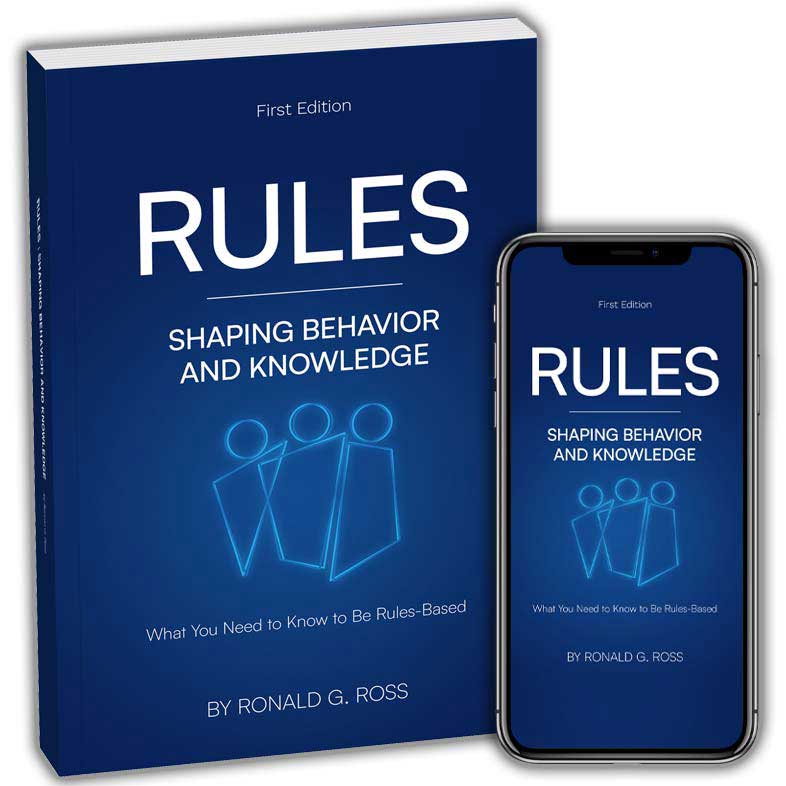Preface to Rules — Shaping Behavior and Knowledge
Ron's treatment of rules is highly pragmatic. Rules are at the center of a surprising number of professions and issues we all collectively face. No matter what the latest developments in artificial intelligence — or perhaps because of them — it's time the industry refocuses on rules. In this extract from the Preface, Ron gives his perspective on the big picture in that regard.
Extracted from Rules: Shaping Behavior and Knowledge, by Ronald G. Ross, 2023.
https://www.brsolutions.com/rules
Rules apply everywhere in human activity, but in particular to business and government. Rules can be discussed without reference to artificial intelligence (AI) or mimicking human intelligence in any form. But rules prove critical for that as well.
Rules are about governing; that is, about coordinating groups or communities of people who must live and work together where risks are very real. I'm sure that includes your organization! In that arena, the focus needs to be on behavior and behavioral rules, whether automated or not, and on violations of those rules. And on what rights behavioral rules confer on parties, whether in contracts and agreements or otherwise.
This orientation is quite different from most of what has been written about rules in the past. It is not about exploring inferencing or statistical machine intelligence.
Instead, it is about what real organizations need every day in analyzing and automating explicit guidance for their business, including policy, legal obligations, and deep differentiating knowledge. In that regard, it is very practical and down to earth; all about better rules for business and government.
The focus also needs to be on natural language and its semantics. How else can groups and communities of people formally organize and manage themselves?! In that sense you can consider explicit rules the ultimate push-back against black-box algorithms in any area of human activity where they don't belong. And there are quite a few such areas!
In some respects, rules are more akin to legal practices and training than to the software engineering and current trends in AI. In other words, rules for groups and communities of people are first and foremost a communication problem, not an engineering problem.
We should recognize that the law has had centuries to develop patterns of thinking and practices relevant to governing and to coordinating groups and communities of people. Also, the skills definitely overlap — close reading, critical thinking, and careful writing. What policy interpreter or business analyst doesn't need those skills?!
It all boils down to this. Rules and rule analysis are a vital area of competency for business and government. We need a solid foundation for fully developing and supporting that competency.
The Current State of Rules
After so many years working with rules, I've come to a realization. Most people understand rules intuitively, but many fail to understand them well enough to work with them effectively.
Let me clarify. Governments certainly know what rules are (although perhaps not in a formal or computable sense). And those parts of business that must deal with governments and with other legal matters are fairly clear about them too (although again, not formally). How could they not be? It's been said that rules (the law) are the operating system of society.
What about business analysts, requirements professionals, and software developers? Do they understand rules well enough? With a few exceptions, not even close. I've spent countless hours trying to explain that rules and requirements are not the same thing. Requirements for automated solutions are often based on rules, but that's by no means the same. Unfortunately, many have been badly misled in that regard.
What about the software industry? I'm absolutely certain the software industry does not understand what rules for business and government are about. How can I be so sure? Because it still simply has not delivered the right platforms to support them. Without the right tooling, it is hardly a surprise that most business analysts, requirements professionals, and software developers are not clear about rules either.
Look at the evidence. The overwhelming majority of rules for business and government are still implemented using procedural software languages not at all built for that purpose.
That simply won't do. For one thing, it's not agile in the least. For another, it doesn't come even close to real-time insertion of sentiment, human discretion, and common sense in everyday activity. It's also woefully inadequate for situational sensitivity and situational awareness. And it's obviously not working for data quality. So, there's a huge current hole in current software platforms, which urgently needs closing.
These days interest in rules arises in unexpected areas of the industry. Digital contracts anyone? Better know about rules! Better governance? Recent developments in Rules As Code and Law As Code are interesting, though not yet much known outside law and government circles.
Although you'll find almost everything about rules is mostly just common sense, current platforms simply don't work this way. Direct support for key features of rules for groups and communities of people, especially violations, is simply missing. We need significant, clear-headed innovation in software platforms.
Professionals Who Need To Know About Rules
Which practitioners need to know about rules? Here's a partial list:
| Policy Maker | Legal Staff | Product Owner |
| Policy Advisor | Contract Drafter | Data Quality Professional |
| Policy Interpreter | Auditor | Data Governance Professional |
| Legislative Drafter | Risk Analyst | Business Process Manager |
| Rule Maker | Decision Modeler | Business Process Analyst |
| Rule Analyst | Business Analyst | Business System Analyst |
| Regulator | Requirements Engineer | Business Software Developer |
| Compliance Officer |
If your role or responsibility involves one or more of the above, you need practical insights and ideas you can apply in your daily responsibilities.
In addition, I believe rules should be studied in universities, business schools, and law schools. These core ideas should be taught as widely as possible. After all, being rule-based is the most basic characteristic of Western civilization.
# # #
About our Contributor:
Online Interactive Training Series
In response to a great many requests, Business Rule Solutions now offers at-a-distance learning options. No travel, no backlogs, no hassles. Same great instructors, but with schedules, content and pricing designed to meet the special needs of busy professionals.












How to Define Business Terms in Plain English: A Primer
How to Use DecisionSpeak™ and Question Charts (Q-Charts™)
Decision Tables - A Primer: How to Use TableSpeak™
Tabulation of Lists in RuleSpeak®: A Primer - Using "The Following" Clause
Business Agility Manifesto
Business Rules Manifesto
Business Motivation Model
Decision Vocabulary
[Download]
[Download]
Semantics of Business Vocabulary and Business Rules